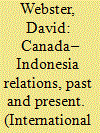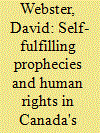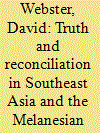|
|
|
Sort Order |
|
|
|
Items / Page
|
|
|
|
|
|
|
| Srl | Item |
| 1 |
ID:
169209


|
|
|
|
|
| Summary/Abstract |
Canada–Indonesia relations recently passed their 65th anniversary, but they still have a tentative air about them. Despite regular talk about developing a strong Canadian relationship with a country that potentially has much in common with Canada, Canada–Indonesia relations have mostly been friendly but shallow. An overview of the history of bilateral relations, from the opening of a Canadian mission in 1953 to recent bilateral deals committing Ottawa and Jakarta to various forms of collaboration, reveals that rhetoric about common interests has some substance, but a new announcement amidst good intentions every few years is not likely to lead to any deep partnership. There are, however, foundations for closer ties in civil society, including in the fields of economic development, truth and reconciliation, religious deradicalization, and Indigenous peoples linkages.
|
|
|
|
|
|
|
|
|
|
|
|
|
|
|
|
| 2 |
ID:
076398


|
|
|
|
|
| Publication |
2007.
|
| Summary/Abstract |
Popular movements in Aceh and Papua seeking separation from Indonesia must be understood in the context of earlier nationalist movements in history, including Indonesia's own movement for independence from the Netherlands. Movements in Aceh and Papua have built a sense of identity, considering themselves to be 'notion-states' even if they are not yet nation-states. This process parallels Indonesian identity formation in the early twentieth century. Aceh originally combined local, Indonesian and Islamic identities, but intrusion by central government institutions sparked a defensive nationalist reaction, which was stimulated further by uneven economic development and by repressive tactics by the centre. Papua was incorporated into Indonesia by means that led local people to believe they had been denied their right to self-determination, spurring a historical sense of grievance and a collective identity of shared suffering much like that in Aceh. By the end of Sukarno's Guided Democracy and Suharto's New Order, both territories had passed a point of no return in their nationalism. Repressive tactics have failed to contain aspirations for independence; a new approach based on dialogue is needed.
|
|
|
|
|
|
|
|
|
|
|
|
|
|
|
|
| 3 |
ID:
082599


|
|
|
|
|
| Publication |
2008.
|
| Summary/Abstract |
In writing their report, the members of East Timor's Commission for Truth, Reconciliation and Reception (CAVR) were keenly aware of the ways the understanding of history could shape the new nation. Offering a "focus on the past for the sake of the future," they searched for a usable past. There is an uneasy tension in the report between this quest for a single agreed national narrative of the past, and the search for complexities and an inside, non-elite perspective.
The CAVR report rejects the official Indonesian narrative that asserted Indonesian military occupation was the only thing preventing "civil war." It equally rejects the international understanding, dominant for many years, that East Timorese independence was a "lost cause." It presents a counter-narrative of a united people, fighting for freedom amidst repression, until their final triumph. It is framed almost as a Catholic story of original sin, suffering and redemption. An ideologically driven, internally divisive and internationally counterproductive campaign gave way to an apolitical, united struggle able to win international support, the report suggests. The narrative arc runs "from divergence to convergence," and rests on two key concepts: resistance and unity. Where resistance suggests a message of liberation against overwhelming odds, the imperatives of unity suggest it is important to "play by the rules" of the international system. In some ways this is the dilemma of East Timor as an independent state.
|
|
|
|
|
|
|
|
|
|
|
|
|
|
|
|
| 4 |
ID:
178197


|
|
|
|
|
| Summary/Abstract |
This article takes up the concept of mental maps as lens through which to survey Canada–Asia relations. Before Canadians could embrace Asia politically and economically, they had to stop imagining Asia as culturally distant. Their mental maps—the way they imagined the world—formed the invisible background to policy-making. Through an engagement with Greg Donaghy’s work on Canadian relations with Asia, this article makes the case for using mental maps to understand trans-Pacific relations.
|
|
|
|
|
|
|
|
|
|
|
|
|
|
|
|
| 5 |
ID:
089047


|
|
|
| 6 |
ID:
102173


|
|
|
| 7 |
ID:
152503


|
|
|
|
|
| Summary/Abstract |
Recent experiences with truth and reconciliation processes in Southeast Asia and the Southwest Pacific suggest that there is a role for historical research and memory in helping to build sustainable peace and stability in new nations—and conversely, that ignoring violent pasts undermines peacebuilding efforts. Two truth commissions have operated in this region, in Timor-Leste (East Timor) and Solomon Islands. There are also calls for truth and reconciliation processes in Indonesia at the national and local levels, including in (West) Papua. As the only Western developed country to have held a full truth commission, Canada could play a powerful role in promoting and supporting mutual dialogue on the implementation of truth and reconciliation outside its borders. We can derive both potential lessons and recommendations for Canadian action to promote truth and reconciliation processes from the cases of Indonesia, Solomon Islands, and Timor-Leste.
|
|
|
|
|
|
|
|
|
|
|
|
|
|
|
|
|
|
|
|
|